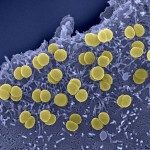Lien vers Pubmed [PMID] – 25587078
J. Med. Microbiol. 2015 Jan;
We previously reported a shift in the electrophoretic type (ET) of invasive MenC in Canada from predominantly ET-15 to ET-37 in the post-MenC conjugate vaccine period. This study sought to confirm this trend by examining all culture-confirmed invasive MenC case isolates in Canada in the period of January 1, 2009 to December 31, 2013. Of the 50 MenC isolates, 18 belonged to ET-15, 28 belonged to ET-37 (but not ET-15), and 4 belonged to other clonal types. Analysis of the serotype and serosubtype antigens, porA and fetA gene sequences provided data to show that invasive MenC belonging to ET-15 and ET-37 were 2 very different subpopulations within the ST-11 clonal complex. Sequence analysis of the fHbp genes suggested that 12 different types of factor H binding protein types were found among the ET-15 isolates while 86% of ET-37 isolates were found to have fHbp genes predicted to encode peptide 22. The nadA gene in 12 MenC isolates were disrupted due to IS1301 insertion and 11 of these 12 isolates belonged to ET-15. Ten percent of the invasive MenC were found to have a frame-shift mutation in their fHbp genes that predicted no fHbp produced. Significant diversity and frame-shift mutations of fHbp genes were found in invasive MenC strains in Canada.

